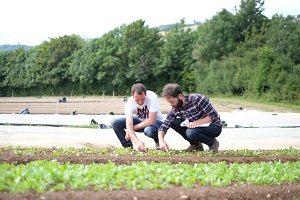New centre puts farmer priorities at heart of innovation research
04 December 2020

- Leading universities team up to focus agricultural research where it can make most difference on the ground
Farmers will have a bigger role in agricultural research and development that works for them, thanks to a new academic centre announced today.
The Centre for Effective Innovation in Agriculture (CEIA) will see five of the most prestigious agricultural universities in the UK work together to address the gap between scientific research on innovation and real-life farming experience. The centre will focus on how research and development investment can best support innovation to be adopted by farmers.
With £1.5m of charitable funding, including from the Elizabeth Creak Charitable Trust and from each University, the virtual centre will be run by experts in agricultural innovation research from the University of Reading, Royal Agricultural University (RAU), Harper Adams University, Newcastle University and the University of Warwick.
Dr David Rose, Elizabeth Creak Associate Professor of Agricultural Innovation and Extension at the University of Reading said:
“Farming needs to change fast to meet the challenges of our time, including tackling climate change, loss of biodiversity and food-related illness, and ensuring resilient and secure food supply chains.
“Although UK public spending on agri-tech R&D is consistently above £300 million per annum, the adoption of research-led innovation is patchy. Crucially, there is currently no dedicated initiative to target research funding where it will be most relevant on the ground.”
The centre will:
- Grow a community of funders and researchers who become passionate about the practical impact of agricultural research and the uptake of innovation by farmers.
- Collate the extensive research evidence on innovation, uptake and adoption into practical guides for policy makers about effective research and innovation funding.
- Advise and support agricultural research and innovation funders, including government, to ensure their programmes are accessible to farmers and well-placed to yield results on the ground.
Prof Tom MacMillan, Elizabeth Creak Chair in Rural Policy and Strategy at the RAU said:
“Farmers innovate under their own steam on everything from blackgrass control to mob grazing, often with scant support. The UK’s main research funders are cottoning onto this, with Defra this week confirming its plans to invest in farmer-led innovation.
“This is great news but as farmers know all too well the devil will be in the detail – whether the funds are easy to access and exactly what they’ll cover. This unique new centre pulls together expertise and experience from across the UK and around the world to help target research funds effectively.”
Paul May, Chair of the Elizabeth Creak Charitable Trust, said:
“As a charity dedicated to the future of farming, we meet some very dynamic farmers and researchers, who share a commitment to improving our industry’s productivity, sustainability and resilience. But what has struck us is how hard it can be marry their efforts – there is government and commercial money for research but it is not necessarily targeted at where farmers will use and benefit from it.
“There is a growing movement of independent farmer-led innovation networks that tries to plug this gap. Rather than simply chip in ourselves to help these in a small way, we want to turn the tide by helping research funders and investors support such efforts on a large scale.”
Centre for Effective Innovation in Agriculture
The Centre for Effective Innovation in Agriculture will launch in April 2021 and is currently recruiting a manager. The centre is a partnership of England’s leading agricultural universities – the University of Reading, University of Warwick, Newcastle University, Harper Adams University and the Royal Agricultural University (RAU) – founded with five years’ funding from the Elizabeth Creak Charitable Trust. It is a strategic initiative that aims to strengthen the impact and benefit of agricultural research at scale. Centre staff will be based at the RAU, Cirencester, coordinating a team from across the five partner universities. For more information about the centre or this role please contact: Prof Tom MacMillan, RAU, tom.macmillan@rau.ac.uk.
Elizabeth Creak Charitable Trust
Elizabeth Creak was a determined, highly capable and well-respected farmer in Warwickshire, who ran a large and innovative dairy farming business developed by her uncle Clyde Higgs. She was the first female chairman of the Warwickshire branch of the NFU and in 1998 she became the first woman to hold the office of High Sheriff of Warwickshire. Elizabeth passed away in October 2013 and left the bulk of her estate to the Elizabeth Creak Charitable Trust. Elizabeth created the Trust to provide ‘Clyde Higgs Scholarships’ in agriculture; support and encourage new blood in farming and finance projects to help farmers survive and ultimately thrive in their challenging modern environment.
Image credit: Innovative Farmers. Dominic Amos, Organic Research Centre and Alex Stephens, Riverford, working on the Hot Water Seed Treatment field lab. All rights reserved.
